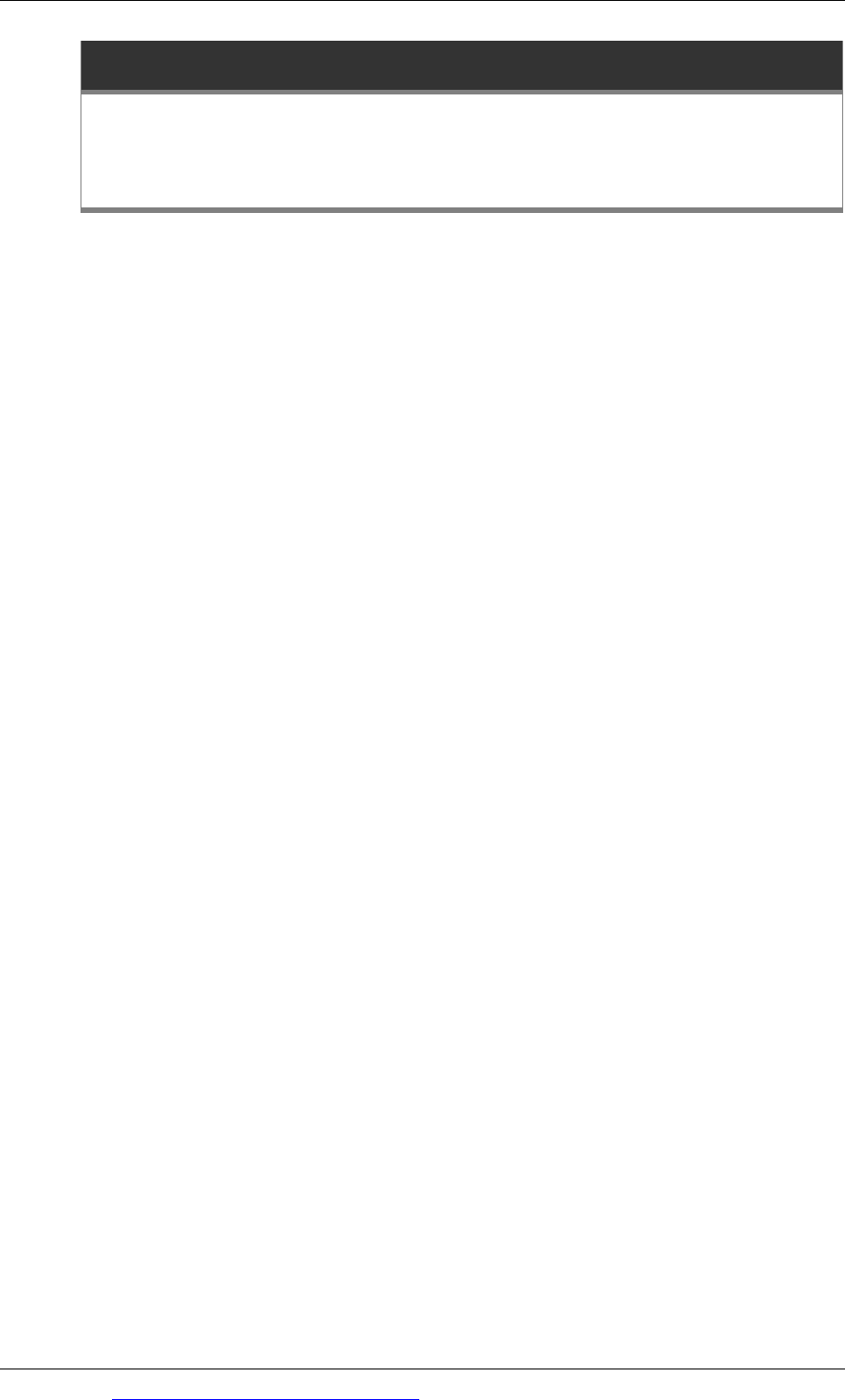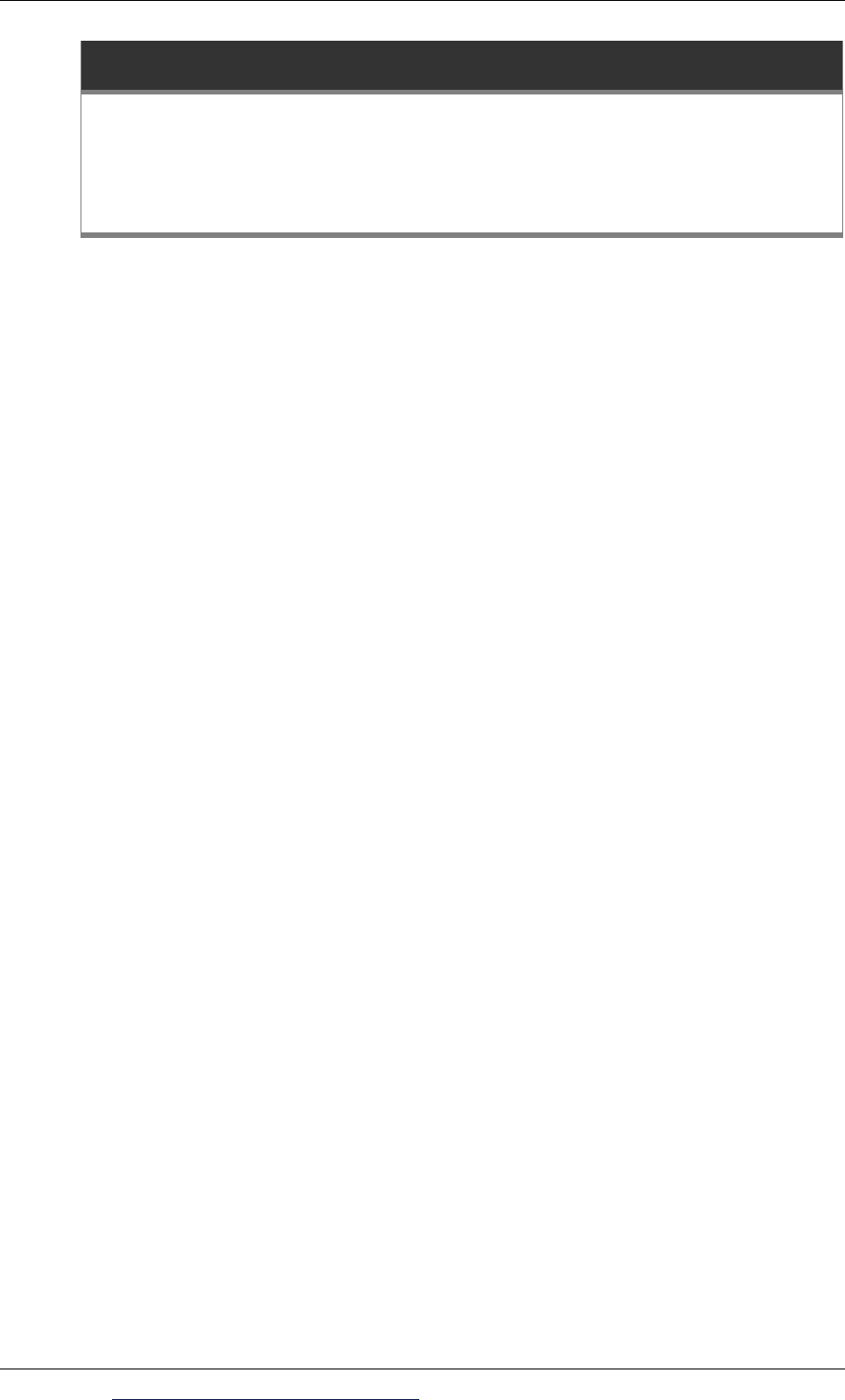ACCA P1 Governance, Risk and Ethics - 2010 - Study text - Emile Woolf Publishing
Подождите немного. Документ загружается.


Chapter 14: Professional practice and codes of ethics
© EWP Go to www.emilewoolfpublishing.com for Q/As, Notes & Study Guides 295
Alvesson and Willmott (1996) have argued that employees come into a company
bringing a notion of fairness and justice with them, which they expect to see within
the company. However, different people have different views of right and wrong.
Fairness and justice are abstract concepts and values that mean different things to
different employees and in different work situations. This is how different cultures
(and different sets of rules) arise.
So how do companies and accountancy firms apply ethical rules of conduct? One
approach is to develop and implement business codes or professional codes of
ethics. If forcefully applied, these can help to create a better understanding by
accountants of what is right and wrong, how to identify moral dilemmas, and how
to act whenever an ethical problem arises.

Paper P1: Professional accountant
296 Go to www.emilewoolfpublishing.com for Q/As, Notes & Study Guides © EWP
Corporate codes of ethics
The nature and purpose of a corporate code of ethics
The content of a corporate code of ethics
Whistleblowing procedures
2 Corporate codes of ethics
2.1 The nature and purpose of a corporate code of ethics
A corporate code of ethics is a code of ethical behaviour, issued by the board of
directors of a company. It is a formal written statement, and should be distributed
or easily available to all employees. The decisions and actions of all employees in
the company must be guided by the code.
The effectiveness of a code of ethics depends on the leadership of the company – its
directors and senior managers. These individuals must be seen to comply
themselves with the ethical code; otherwise other employees will see no purpose in
complying with the code themselves. The culture of a company drives its ethical
behaviour, and a code of ethics provides useful guidance.
It has been suggested that there are three reasons why companies might develop a
code of ethics. These reasons are progressive, which means that companies might
begin by having a code of ethics for the first reason, but then progress to the second
and third reasons as they gain experience with implementing the code and
appreciating its potential benefits.
Reason 1: Managing for compliance. The company wants to ensure that all its
employees comply with relevant laws and regulations, and conduct themselves
in a way that the public expects. For example, companies providing a service to
the general public need to ensure that their employees are polite and well-
behaved in their dealings with customers.
Reason 2: Managing stakeholder relations. A code of ethics can help to improve
and develop the relations between the company and its stakeholders, by
improving the trust that stakeholders have in the company. The code might
therefore include the ethical stance of the company on disclosing information to
stakeholders and the investing public (openness and transparency) and on
respecting the rights of stakeholders.
Reason 3: Creating a value-based organisation. A company might recognise the
long-term benefits of creating an ethical culture, and encouraging employees to
act and think in a way that is consistent with the values in its code of ethics. (It
could be argued that an ethical company, like a well-governed company, is more
likely to be successful in business in the long term. However, there is no firm
evidence to prove this point, and it is therefore a matter of opinion.)
Note on global organisations. Global companies might have difficulty in
developing and implementing a code of ethics for the entire organisation world-

Chapter 14: Professional practice and codes of ethics
© EWP Go to www.emilewoolfpublishing.com for Q/As, Notes & Study Guides 297
wide, because of differences in ethical values in different cultures in different parts
of the world. A criticism of codes of ethics of global companies is that they often
focus on the company’s relationships with stakeholders in their ‘home country’ and
do not give enough thought to their operations in other countries.
2.2 The content of a corporate code of ethics
A corporate code of ethics is normally quite short, dealing with each point in just a
few sentences, and sometimes in just one sentence.
There is no standard format or content for a code of ethics, but a typical code
contains:
general statements about ethical conduct by employees
specific reference to the company’s dealings with each stakeholder group, such
as employees, customers, shareholders and local communities.
General statements about ethical conduct
A code of conduct should specify that compliance with local laws is essential. In
addition, employees should comply with the policies and procedures of the
company. There might be a statement that any employee who fails to comply with
the company’s code of conduct will face disciplinary action.
The code might also include an overview of business conduct, and the need to
protect the company’s reputation and ‘good name’.
It might also contain statements about the values of the company, such as:
acting at all times with integrity
protecting the environment
the ‘pursuit of excellence’
respect for the individual.
Dealings with stakeholder groups
A code of conduct might address its main concerns about its dealings with
stakeholder groups and its ethical treatment of each group.
Employees. A code of ethics might include statements about:
- human rights, including the right of all employees to join legally-authorised
organisations such as a trade union or political party
- equal opportunities for all employees, regardless of gender, race, ethnic
origin, religion, age, disability or sexual orientation
- refusal to tolerate harassment of employees by colleagues or managers
- concern for the health and safety of employees
- respect for the privacy of confidential information about each employee
- company policy on giving or receiving entertainment or bribes.

Paper P1: Professional accountant
298 Go to www.emilewoolfpublishing.com for Q/As, Notes & Study Guides © EWP
Customers. A code of ethics might include statements about:
- fair dealing with customers
- product safety and/or product quality
- the truthfulness of advertisements
- respect for the privacy of confidential information about each customer.
Competitors. A code of ethics might include statements about:
- fair dealing with competitors
- the use of techniques for obtaining information about competitors (industrial
spying)
Shareholders. A code of ethics might not include much about shareholders,
because the relationship between a company and its shareholders might be
contained in a code of corporate governance that the company follows. The key
issue with shareholders is to maintain and develop trust and confidence, which
might be achieved through disclosure of information (openness and
transparency).
Example
The Institute of Business Ethics (www.ibe.co.uk) provides the following broad
guidelines to the content of a code of corporate ethics. (This material is © The
Institute of Business Ethics and has been reproduced by kin permission)
1PrefaceorIntroduction
(signedbytheChairmanorChiefExecutiveOfficerorboth)
Start with a sentence on the purpose of the Statement. Mention thevalues that are
importantto seniormanagement intheconduct ofthe business‐such as integrity,
responsibilityandreputation.Describethe
commitmentofthecompany’sleadersto
maintaining high standards both within the company and in its dealings with
others.
Set out the role of the company in the community and end with a personal
endorsement of the code (by the chairman or CEO, or both)and the expectation
thatthe
standardsetoutinitwillbemaintainedbyallinvolvedintheorganisation.
2Keyareasofthecodeshouldinclude:
(a) Thepurposeandvaluesofthebusiness
Theservicethatthecompanyisproviding‐agroupofproductsorsetof
services.
Thefinancialobjectivesofthecompany.
Theroleofthecompanyinsociety(asthecompanyseesit).

Chapter 14: Professional practice and codes of ethics
© EWP Go to www.emilewoolfpublishing.com for Q/As, Notes & Study Guides 299
(b) Employees
Howthebusinessvaluesitsemployees.
Thecompanyʹspolicieson:workingconditions,recruitment,
developmentandtraining,rewards,health,safetyandsecurity,equal
opportunities,diversity,retirement,redundancy,discriminationand
harassment.
Useofcompanyassetsbyemployees.
(c) Customerrelations
Theimportanceofcustomersatisfactionandgoodfaithinallagreements,
quality,fairpricingandafter‐salesservice.
(d) Shareholdersandotherprovidersofmoney
Theprotectionofinvestmentmadeinthecompanyandproperʹreturnʹon
moneylent.
Acommitmenttoaccurateandtimelycommunicationonachievements
andprospects.
(e) Suppliers
Promptsettlingofbills.
Co‐operationtoachievequalityandefficiency.
Nobriberyorexcesshospitalityacceptedorgiven.
(f) Societyorthewidercommunity
Compliancewiththespiritoflawsaswellastheletterofthelaw.
Thecompanyʹsobligationstoprotectandpreservetheenvironment.
Theinvolvementofthecompanyanditsstaffinlocalaffairs.
Thecorporatepolicyonsponsorshipaswellasgivingtoeducationand
charitableappeals.
(g) Implementation
Theprocessbywhichthecodeisissuedandused.
Meanstoobtainadvice.
Awarenessraisingexamples(Q&As)
Trainingprogrammesforallstaff.
(h) Assurance,reportingandreviews
Suggestwaysofknowingthecodeiseffective
Reporttotheboardorboardcommitteeatleastannually
Reviewtheproceduresforupdatingthecode
2.3 Whistleblowing procedures
‘Whistleblowing’ means reporting suspicions of illegal or improper behaviour to a
person in authority.

Paper P1: Professional accountant
300 Go to www.emilewoolfpublishing.com for Q/As, Notes & Study Guides © EWP
In a normal situation, employees report to their supervisor or manager. If an
employee has concerns about a transaction or a plan of action, and thinks that it
might be unethical (illegal or against the company’s code of ethical conduct) he or
she should normally report the concern to the supervisor or manager.
A problem arises whenever:
the supervisor or manager is involved in the illegal or unethical activity, or
the employee has spoken to the supervisor or manager about the problem, but
the supervisor or manager has taken no action and has ignored the matter, or
dismissed it as something that is not important.
In these situations, the employee would have to report his or her concerns through a
different reporting channel. In practice, this could mean reporting the matter to a
director or a committee of the board of directors. Some companies have established
procedures that allow employees to report their concerns (‘blow the whistle’).
Problems with whistle blowing
There are several problems with whistle blowing.
Experience in many organisations has shown that when an individual reports
concerns about illegal or unethical conduct, the individual is often victimised, by
colleagues and management. If the allegations by the individual are rejected, the
individual might find that he (or she) does not receive the same salary increases
as colleagues, and is overlooked for promotion. At work, colleagues and
managers might treat the individual with hostility, making it difficult for the
individual to continue in the job.
On the other hand, some individuals make allegations about colleagues or
managers that are unfounded. The allegations might be made for reasons of
malice and dislike, or because there has been an argument at work. Malicious
allegations about colleagues and managers should not be tolerated.
A problem facing companies is therefore:
how to encourage reports of illegal or unethical behaviour, by protecting honest
whistle blowers, but
how to discourage malicious and unfounded allegations.
A company might state its policy on whistle blowing within its code of conduct. For
example, a corporate code of ethics might include the following statements.
Every employee should make known their concerns about illegal or unethical
behaviour in the work place. If there are doubts, the employee should ask first,
because incorrect behaviour might not be intentionally dishonest. It might be
caused by a lack of information or by trying to get a job done too quickly. (This
aspect of a code of ethics is to encourage employees to speak about their
concerns, but to try to resolve them first by discussion with colleagues and
managers.)

Chapter 14: Professional practice and codes of ethics
© EWP Go to www.emilewoolfpublishing.com for Q/As, Notes & Study Guides 301
An employee is doing the right thing if, in good faith, he seeks advice about
improper behaviour or reports improper behaviour. (Whistle blowing is the
correct thing to do, if the employee does it in good faith and is not being
malicious.)
The company will not tolerate any action taken by anyone in the company
against an individual who has reported in good faith their concerns about illegal
or unethical behaviour. (This is a statement that whistle blowers will be
protected, if they have made their report in good faith.)
Disciplinary action will be taken against any employee who knowingly makes a
false report of illegal or improper behaviour by someone else. (Malicious
reporting will not be tolerated.)
Unfortunately, in practice, it seems that in many cases whistle blowers are not given
adequate protection by their employer.

Paper P1: Professional accountant
302 Go to www.emilewoolfpublishing.com for Q/As, Notes & Study Guides © EWP
Codes of ethics for accountants
The need for a professional code of ethics for accountants
The IFAC Code (Code of Ethics for Professional Accountants) and ACCA
Code
Fundamental principles
3 Codes of ethics for accountants
3.1 The need for a professional code of ethics for accountants
Every professional accountancy body has issued a code of conduct and code of
ethics for its members and student members.
Even when an individual works for a company or a firm of accountants that has its
own code of ethics, there is a need for a professional code of conduct. This is
because accountants have a professional duty to act in the public interest, and this
aspect of professional behaviour is not covered by corporate ethical codes.
3.2 The IFAC Code (Code of Ethics for Professional Accountants) and
ACCA Code
Although each professional accountancy body has its own code of ethics, all codes
are similar, because they are based on the IFAC Code. The IFAC Code (most recent
version 2005) is issued by the Ethics Committee of the International Federation of
Accountants, whose members include the professional accountancy bodies of most
countries.
The IFAC Code sets our the ethical requirements for professional accountants and
states that any member body of IFAC (such as the ACCA) or any individual firm of
accountants may not apply ethical standards that are less strict than those in the
IFAC Code.
The IFAC Code therefore establishes a minimum world-wide code of ethical
conduct for accountants. The IFAC Code is divided into three parts:
general principles and application of the code
guidelines for accountants in public practice
guidelines for accountants in business.
The same general ethical principles apply to all accountants. The circumstances in
which ethical problems arise are different between accountants in practice and
accountants in business. Accountants in practice have to deal in an ethical way with
issues arising from the client relationship. Accountants in business have to deal
with ethical issues where they are employees of the organisation in which the
ethical problem has occurred.

Chapter 14: Professional practice and codes of ethics
© EWP Go to www.emilewoolfpublishing.com for Q/As, Notes & Study Guides 303
The ACCA Code of Ethics and Conduct contains similar provisions to the IFAC
Code, but is structured differently. It is contained in the ACCA Rulebook, which can
be found on the ACCA website.
The description of professional ethics that follows is based on both the IFAC Code
and ACCA Code.
Principles-based ethics codes and rules-based ethics codes
It would be possible for a regulatory body to issue a code of ethics for accountants
that contains specific rules about how they should act in specific situations. This
would be a rules-based code of ethics.
Rules-based codes have several weaknesses:
There are many different situations that an accountant might face where an
ethical decision must be made. Circumstances can be complex and varied, and it
is impossible to plan for every type of ethical problem that will arise, and make a
rule in advance – without knowing the exact details of the situation – of what
course of action the accountant must take.
Over time, the type of situations (ethical dilemmas) that an accountant might
face could change, as the business environment changes. It might therefore be
necessary to review and update the rule book regularly.
Ethical views differ between countries and cultures. Behaviour that might be
considered slightly unethical in one country might be perfectly normal and
acceptable in another country. A rule book cannot easily make allowances for
national and cultural differences in ethical viewpoint.
A principles-based code of ethics for accountants is a code that specifies general
principles of ethical behaviour, and requires the professional accountant to act in
accordance with the principles. The accountant is required to use judgement in
deciding whether in each case a particular course of action is a ‘proper’ or ‘ethical’
one.
3.3 Fundamental principles
Professional accountants are required to comply with the following fundamental
principles:
integrity
objectivity
professional competence and due care
confidentiality
professional behaviour
technical standards.
These have been mentioned in earlier chapters. The ACCA Code explains the
fundamental principles as follows: ‘Ethics is about the principles we use to judge the
right and wrong of our actions…. It is about the fundamental principles that our

Paper P1: Professional accountant
304 Go to www.emilewoolfpublishing.com for Q/As, Notes & Study Guides © EWP
members review and agree to each year when they renew their ACCA membership
and submit their CPD (continuing professional development) return.’
Integrity
An accountant must be honest and straightforward in his professional and business
dealings. This includes a requirement for ‘fair dealing’ and a requirement to be
truthful.
Objectivity
An accountant must not allow his professional or business judgement to be affected
by:
bias (personal prejudice)
conflicts of interest
undue influence from others: for accountants in business, this includes undue
pressure from the employer (senior management).
A very important aspect of integrity is that an accountant should not be associated
with reports or any other provision of information where he or she believes that:
the information contains a materially false or misleading statement
the information contains a statement that has been prepared and provided
recklessly, without proper care or consideration for its accuracy
there are omissions or the information is presented in a way that makes the
relevant information difficult to see, with the effect that the information could be
seriously misleading.
For accountants in public practice, ‘integrity’ is often associated with independence
of mind and judgement. For accountants in business, the concept of independence is
not relevant: however, accountants in business should try to apply the principle of
objectivity in all the work that they do.
For accountants in business, the concept of integrity also means observing the terms
of his or her employment, but avoiding involvement in any activity that is illegal. If
asked or encouraged to become involved in unlawful activity, the accountant must
say no.
Professional competence and due care
An accountant has a duty to maintain his professional knowledge and skills at a
level that enables him to provide a competent professional service to his clients or
employer. This includes a requirement to keep up to date with developments in
areas of accounting that are relevant to the work that he does.
Accountants should also act in accordance with relevant technical and professional
standards when doing their work for clients or employer.
